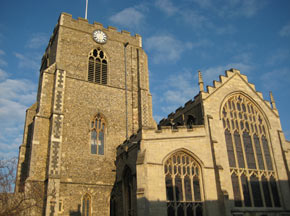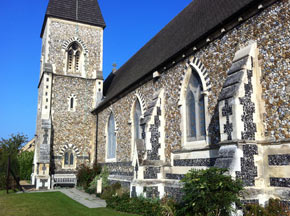Biblical guidance: Matthew 6:9-13; 1 Timothy 2:1-4; Romans 8:26-27
THE AIM OF INTERCESSIONS WITHIN OUR SERVICES
- To lead the congregation in prayer for other people and for situations
- To pray for God’s Kingdom to come, for God’s will to be done and for our ‘daily bread’ (Matthew 6:9-13)
- To pray for everyone, especially those in authority, that we may live peaceful and quiet lives in all godliness and holiness – so that all people will be saved
- To model intercessory prayer, so that what we do in our services becomes part of our everyday lives
They are not the place for
- Confession or meditation
- Telling God what is what
- Telling people what God thinks
- Telling people what you think (about the latest hot topic!)
MECHANICS
1. Receive the rota. Please be gracious! If you are not available, arrange a swap and tell the warden
2. Prepare the intercessions. Pray them yourself before the service.
3. Time yourself in advance, reading at ‘prayer speed’. Intercessions should not be longer than 4 minutes.
4. Arrive in church at least 10 minutes before service begins. Make sure the warden knows you are there.
5. Ask for feedback from service leader, your friends … and your enemies!
FOR WHOM DO WE PRAY?
“I urge, then, first of all, that petitions, prayers, intercessions and thanksgiving be made for everyone”
1. THE WORLD
The emphasis is that we pray for everyone everywhere. We do not pray for nations, but for leaders of the nations, and the people of those nations.
- Do we pray for peace? Or rather should we not pray for people that they might know peace?
- For people who are victims of environmental disaster, economic problems, injustice, prisoners of conscience
- For those who have to take decisions that affect our lives: political and national leaders, business leaders, media leaders.
- Praying for the head of state. We pray for an individual, using that individual as a way of praying in a specific way for all the people who they represent (eg. prayer for the Queen, in her role as head of state – what we pray for her, we pray for the people of this country) Caution: How is that heard?
What am I actually praying for? What are we asking for?
2. THE LOCAL COMMUNITY
We have a particular responsibility for our town and parish.
- Local community – people in positions of responsibility (politicians), business leaders, media, police leaders), police, families, couples, singles, younger people, older people (residential homes: Cullum Road, Cornwallis Court, Glastonbury Court)
- People who work in local institutions: businesses (What could we pray for Greene King?), hospital, hospice, Drummond Court, schools (Guildhall Feoffment, Westgate, St Edmunds, St James, Horringer Court Middle, St Louis)
*Be alert to the latest news from paper/TV/radio: but don’t become a newsreader.
3. THE CHURCH (the people of God)
- International: Church leaders (of different denominations), overseas churches, churches facing persecution, mission partners (Ball’s, work in Diocese of Kiteto)
- Our specific mission focus for the month: use Hazel’s article in magazine, or go to website of different societies, for ideas of what to pray.
- National: Archbishops, witness, unity, synods
- Local: Our own bishops (as we pray for them we pray for the diocese). Different church organisations, church leaders (Southgate, Westgate, St Edmunds, Vineyard, West Road, URC, Garland Street, Cathedral, Christ Church, North Bury Team, Kingsgate), evangelism, youth organizations (BCY), Sporting 87, CAP
- Parish: homegroups, mens group, Inspiring Women, lunch and chat, CYFA, Pathfinders, Sunday school groups, staff and office, church committees, different congregations (expression of unity); those involved with Introducing Jesus, Christianity explored, Alpha. Those working on specific projects (Reordering, Thomas Clarkson Centre, St Peter’s anniversary celebrations). Staff
- Specific events in our churches life: look at notice sheet (usually on web by the Friday before the Sunday)
Caution: Focus on one or two things. Do not give a long list.
4. INDIVIDUALS
God works through individuals (2 Chronicles 36:22). If we don’t pray specific prayers we cannot expect specific answers. This is especially true when praying for mission (eg. Colossians 4:2ff)
- Individuals with a specific task:
- Individuals in need: Use the ‘Focus for Prayer’ (We are all in need, but there are some people whose situation particularly touches us).
- Individuals bereaved
Pray with confidence, trusting God’s promises (This is why we do not pray for the dead, although we can ‘Give thanks for them’, or ‘Remember them before God’)
HOW DO I KNOW WHO TO PRAY FOR?
What is big this coming week? (eg. Elections)
What has touched you this week? Financial difficulty? A successful business deal? A news story?
Warning: Try not to be too personal: if there is something personal, make it a general.
What has touched the community? Use the specific to pray out to the general. (eg. A child killed in a road accident: “We pray for the family – that in their sorrow they will know comfort of friends, hope, strength and peace. We pray for other families who have lost children”). Ask – what is it (if anything) that people will have on their minds as they come to church (eg. school reorganization)
What are the issues that we are supporting or dealing with as a Christian community: mission focus, new curate, Christianity Explored and Introducing Jesus, Holiday club. Use notice sheet – usually on website by Friday.
What is the bible passage about? Does it give any hints? (Warning: Do not preach another sermon!)
PLANNING PRAYERS FOR NORMAL SERVICES
1. Include standard forms of prayer (eg. Common Worship framework can be very helpful). But vary order if appropriate.
Forms can be found in Common Worship: (page 281-289) or on the Common Worship pages of the Church of England website.
Using responses: repeat response at beginning, so people know what it is that they are being asked to say. Keep the response very simple! Use background music: (eg. Taize, ‘O Lord hear my prayer’)
2. Use other forms
Vision statement:
Worship God (pray that God will be honoured); Teach bible (pray for bible teachers and home groups); Grow people in faith and love (pray for people suffering that they might be able to grow); Equip people to serve (pray for some of areas that we are serving, possibly include mission focus); Offer opportunities for people to meet with Jesus (pray for Introducing Jesus etc)
Hand: Give thanks; those who point the way; leaders (political, cultural, economic); those in need and those who care; ourselves
3. Add your own choice of prayers.
You may like to use
a) set prayers from service book
b) published prayers from other books
c) prayers you write yourself for the occasion
4. Keep prayers short and easy to concentrate on. Any prayers you choose/write should be no longer than the average ‘collect’ length.
5. Do not pray ‘spur of the moment’ prayers, unless you are sure it is appropriate. Usually they ramble and waffle.
6. Don’t try and cover everything. It might be right to simply focus on one country or on one situation.
7. Allow other people to pray
- Use silence. Give people time to think and pray time (When you say ‘Let’s have silence’ it will seem much longer to you, so time it on your watch: 15-30 seconds of silence is a good length of time)
- Don’t preach at people, or express your own personal viewpoint (eg. we pray that the Liberal Party will win the next general election)
- Avoid the temptation to teach during prayers : prayers are from the people to God, not vice-versa!! Also be extremely careful when praying about subjects which may be sensitive to members of the congregation, such as divorce, etc.
8. Use an introduction (eg. ‘We pray for next week’s invitation service’), followed by silence and then a prayer, and/or a response.
9. Include thanksgiving in your prayers.
BEGINNING AND ENDING PRAYERS
An opening sentence or promise from the Bible can set the right tone or theme for the prayers.
Biddings
“Let us pray for the Church and for the world,
[and let us thank God for his goodness]”.
“In the power of the Spirit and in union with Christ,
let us pray to the Father”.
“From the rising of the sun to its setting, let us pray to the Lord”.
“Let us pray to the Father”. The chosen versicle and response follow.
One of these responses may be used in a set of prayers
General
Lord, in your mercy
All hear our prayer.
Lord, hear us.
All Lord, graciously hear us.
God of love
All hear our prayer.
Father of all
All hear your children’s prayer.
In faith we pray
All we pray to you our God.
Lord, meet us in the silence
All and hear our prayer.
In seasons
Father of life
All make known your glory.
Lord, revealed in the world
All hear our prayer.
Lord, we come to the cross
All in your mercy, hear us.
Lord of life
All in your mercy, hear us.
Father, Lord of creation
All in your mercy, hear us.
As we pray to the Father
All Lord, send your Spirit.
Father, by your Spirit
All bring in your kingdom.
Your kingdom come
All your will be done.
Ending prayers
Acknowledgement that we are praying together with the saints.
“Rejoicing in the fellowship of [N and of] all your saints,
we commend ourselves and the whole creation to your unfailing love.”
Liturgical endings:
‘Merciful Father …’
‘The Grace’ may be appropriate (occasionally) at the end of prayers, although for many people they will hear that as the end of the service.
Be open to the Spirit. You might be led to do something very different (eg. open prayer, splitting people into groups for prayer, active prayer) but please check with the service leader or vicar that it is appropriate for this particular service.
FINALLY
- Remember to whom we are praying: ‘Our Father in Heaven’
- Remember for what we are praying: ‘Your kingdom come, your will be done’
- Remember why we are able to pray: ‘Jesus Christ, the Son of God, our Lord’
- Remember our need for the Holy Spirit
Other resources
https://www.churchofengland.org/prayer-and-worship/topical-prayers/leading-prayer-through-intercessions

